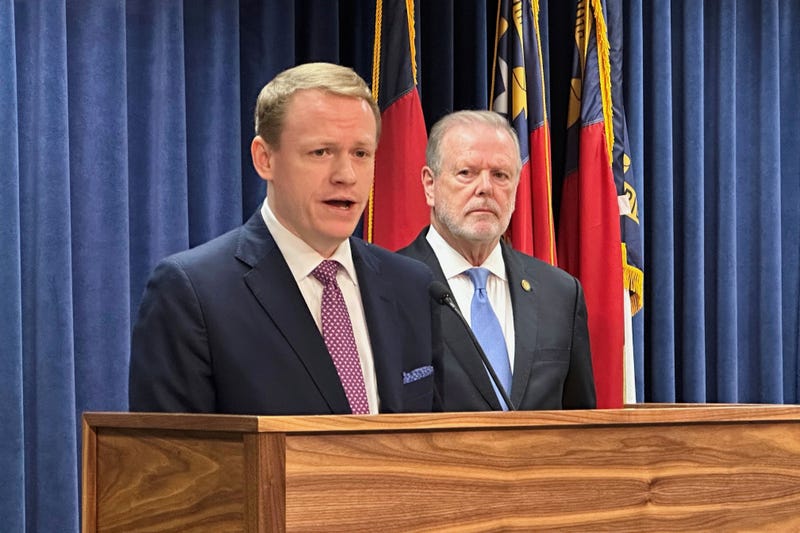
RALEIGH, N.C. (AP) — North Carolina Republican legislative leaders announced plans Monday to vote next week on redrawing the state's U.S. House district map, taking up President Donald Trump’s call to secure more GOP seats nationwide and resist rival moves by Democrats.
The push to retool already right-leaning boundaries for the ninth-largest state comes amid a major party battle spanning several states to revamp district lines to partisan advantage ahead of the 2026 midterm elections.
North Carolina Republicans created a map in 2023 that resulted in GOP candidates winning 10 of the state’s 14 U.S. House seats in 2024. That compared to a 7-7 seat split between Democrats and the GOP under the map used in 2022.
Now only one of the House districts –- the 1st District currently represented by Democratic Rep. Don Davis –- is considered a true swing district and could be targeted by the GOP for an 11th seat. Davis won a second term last year by less than 2 percentage points, so shifting slightly portions of the district covering more than 20 northeastern counties could help a Republican candidate in a strong GOP year. But it could weaken districts held by GOP incumbents.
The state's top Republican legislators said their planned action follows Trump’s "call urging legislatures across the country to take action to nullify Democrat redistricting efforts.” Davis wasn't mentioned by name in their news release.
Trump "earned a clear mandate from the voters of North Carolina and the rest of the country, and we intend to defend it by drawing an additional Republican Congressional seat," House Speaker Destin Hall said in the release. Trump has won North Carolina's electoral votes all three times that he's been on the presidential ballot.
But state House Democratic leader Robert Reives said Monday his GOP colleagues “are stealing a congressional district in order to shield themselves from accountability at the ballot box.”
Redistricting fight started in Texas, then spread
Trump kickstarted the national redistricting battle over the summer by urging Republican-led Texas to reshape its U.S. House districts so the GOP could win more seats next year. After overcoming a Democratic walkout, Texas lawmakers redrew the districts to give Republicans a shot at five more seats.
California Democrats reciprocated by passing their own redistricting plan aimed at helping their party win five additional seats, a plan needing voter approval in November to be implemented.
And lawmakers in Republican-led Missouri have approved revised U.S. House districts intended to help Republicans pick up an additional seat there. Other states also are considering redistricting, including Republican-led Indiana and Kansas.
Some North Carolina GOP lawmakers focused complaints Monday on California Gov. Gavin Newsom, who advanced his state's redistricting effort.
“Picking up where Texas left off, we will hold votes in our October session to redraw North Carolina’s congressional map to ensure Gavin Newsom doesn’t decide the congressional majority,” Senate leader Phil Berger said.
Responding on X, Newsom called Berger “another lap dog Republican” and accused the GOP of “rigging elections and trying to cover it up with lies.”
Democratic governor lacks veto power on district lines
North Carolina lawmakers already had planned for a multiday session starting Oct. 20. Republicans hold majorities in both General Assembly chambers and redistricting plans aren’t subject to Democratic Gov. Josh Stein’s veto stamp. Candidate filing for 2026 is supposed to begin Dec. 1.
Addressing voters, Stein said in a statement that “shameless politicians are abusing their power to take away yours” with a redraw.
An intensely competitive midterm election looms in which Democrats need to gain just three seats to take control of the House. The president’s party historically has lost seats in midterm elections, something Trump is trying to avoid. A Democratic takeover could impede Trump’s agenda and lead to investigations of his actions, as occurred during his first term in office.
Litigation could alter, derail some map changes
If and how North Carolina legislators create a more favorable redraw may depend on pending litigation filed by the state NAACP, Common Cause and voters challenging several current congressional districts, including the one represented by Davis, one of three Black representatives from North Carolina. The plaintiffs accuse Republican lawmakers of racially discriminating against Black voters by splitting or packing their voting blocs to help GOP candidates win. The trial ended in July without an immediate ruling.
U.S. House districts typically are redrawn once a decade, after a census. But some states have no prohibition on doing it more frequently. And the U.S. Supreme Court has said there is no federal prohibition on political gerrymandering, in which districts are intentionally drawn to favor one party.
Opponents have filed lawsuits alleging Texas’ latest redistricting unconstitutionally dilutes the votes of minority residents and that Missouri’s mid-decade redistricting isn’t allowed under the state constitution. Meanwhile, Utah’s Republican-led Legislature recently endorsed an altered congressional map — though in response to a court order, not Trump’s demands.
__
This story has been corrected to show North Carolina's 1st District covers more than 20 counties, not less than 20.
__
Associated Press writers David Lieb in Jefferson City, Missouri and Isabella Volmert in Lansing, Michigan contributed to this report.